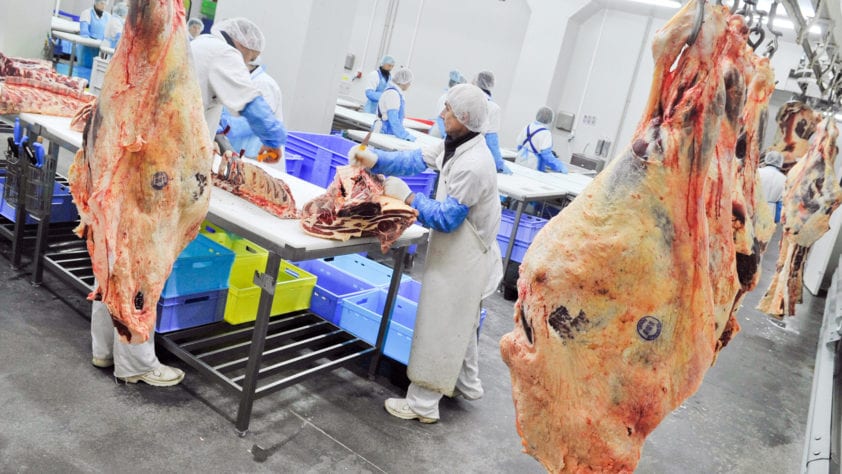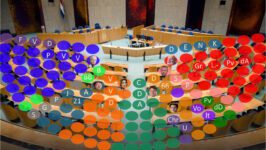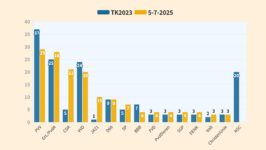If you don't know why something happens, you can't take the right measures to prevent it. This article shows how slaughterhouses are a perfect storm when it comes to viral transmission through aerosols. Yet, the RIVM keeps ignoring this mechanism in favor of maintaining the 1.5-metre rule, at the peril of huge economic damage and 'inexplicable' outbreaks.
Lees volledig artikel: Slaughterhouses and why our (RIVM) policy is so wrong
Slaughterhouses and why our (RIVM) policy is so wrong
If you don’t know why something goes wrong, you can’t take the right measures to prevent it.
That was and is my great criticism of the Corona policy in the Netherlands (and in many other countries, by the way).
What is happening now with the slaughterhouses in the Netherlands will hopefully be a wake-up call, which will make everyone realize which mistakes are being made in our policy and how things can be done better and safer.
It has been known since the beginning of April that things went wrong at slaughterhouses in the US. From the way I look at the COVID-19 virus spreading, it was immediately clear what the reason was for these new “superspreading events”. On May 1st I wrote this blog about it.
Because of the low temperatures in the slaughterhouses, even at high humidity, the specific humidity is well below 6g/kg. Optimal conditions for aerosols, allowing the virus to hover in the air for a long time. And that is why Covid-19 has broken out in slaughterhouses in many places in the world, as I also described on May 1st.
Aerosol contamination
But the aerosol contamination is not recognized by the WHO/RIVM as a way of infecting people on a large scale.
Contamination happens by direct contact and only if you keep a distance of 1.5 meters, you don’t get infected.
So every infection is explained from the point of view that people have not kept that 1.5 meter distance. In the nursing homes (by the lack of mouth caps) and now in those slaughterhouses. (foreigner workers living together in same house, traveling to work in the same van, working close to each other).
But if you look at other industries worldwide with a comparable workforce (such as agriculture and horticulture), you have to ask yourself at least once, why there are no superspread effects there.
If you look at the global outbursts in this particular industry from the latest insights, you will understand exactly what is going on.
“Superspreading events occur because the virus floats for a long time and is inhaled by those present. This happens in confined environments, with poor ventilation and a too low specific humidity (below 6g/kg)”.
Humidity
Remember that at a temperature of 7 degrees and a relative humidity of 70%, the specific humidity is only 4.5 g/kg. Optimal conditions for the virus to float. If people are speaking loud (which is apparently the case in those slaughterhouses) then you have a “perfect storm”.
And that’s why you see a lot of outbreaks in this industry all over the world.
Everywhere you see similar discussions as last night on Dutch TV. All kinds of possible causes are mentioned. The circumstances in the factories are mentioned, but mostly from the point of view of “not being able to keep the 1.5 meters”.
Because that must and shall be the reason, because WHO/RIVM and our Cabinet have imprinted that in the population: “Keep 1.5 meters and you’ll be safe.”
But again: that’s not the reason. The virus remains floating in these slaughterhouses for so long, that many employees are easily infected. Research is showing that time after time.
More important
But finally there is a prominent virologist who acknowledges that the aerosols are much more important than previously assumed by WHO/RIVM and virologists: Prof. Christian Drosten. He explains that in this interview. Regional newspaper Nieuwsblad van het Noorden is one of the few Dutch media that has recognized the importance of this. In their article Drosten literally says: “But if you put everything on the scales, direct contact probably plays less of a role, than the spread via aerosols’.
And under what conditions the aerosols continue to float, the readers of my now 50 blogs in the past 2 months, already know for a long time. And all the experts could have known that a long time ago as well, if they hadn’t looked at all those superspread events that have been there so far from the point of view that you can only be infected if you’re within 1.5 meters of an infected person.
It has very little to do with living and working conditions in the meat processing industry. There are other industries where such conditions are comparable. But it has everything to do with the floating aerosols (something that I also got confirmed via mails after my previous blog by people who know this industry up close).
Studies
And I dare to say even stronger than Prof. Christian Drosten: the vast majority of the infections (if not all) happens because of aerosols. In the context of this blog I won’t go into that in depth, but I refer to these two studies/articles:
- A study of May 13th: The airborne lifetime of small speech droplets and their potential importance in Sars-COV-2 transmission.
The conclusion is: there is a substantial probability that normal speaking causes airborne virus transmission in confined environments.
- Based on this study, the Daily Telegraph concludes “Superspreader events may be responsible for 80% or more of all coronavirus cases”.
In these blogs I also came to the conclusion, based on numerical analysis, that superspreading events are much more important than other types of contamination.
The conclusion I drew from this, is that by far the most important reason why the exponential growth of the virus has stopped in areas above the 30th latitude and has turned towards a decline, is because meetings with larger numbers of people have been banned. All other measures (including social distancing) have hardly any additional effect compared to this intervention.
Harmful
In addition, the entire focus on the 1.5 meter society is not only unnecessary, but also harmful because of the seriously negative economic and social consequences. And that such a society will not prevent outbreaks such as in the meat processing plants, care institutions and the churches that have reopened, such as in Frankfurt, and for example in Georgia.
You would think: “we now know what we have to do”. The RIVM (CDC) and the virologists, who appear everywhere in the media, will finally embrace these findings and ensure an adequate approach.
But I predict that this will not happen (soon). They will say something like “this is something to research, but…” or “these are incidents, we can’t draw conclusions from them yet” or “interesting, but the studies haven’t been peer-reviewed yet”. And then the standard slogan follows, “keep 1.5 meters distance” and the daily threat, “beware of the second wave”.
They understand very well that if they do fully acknowledge the role of aerosols in the contamination process, then the basis of our 1.5 meter society will collapse.
And that is apparently the last thing that both the virologists and our government want. Because that would be too big a turn of policy. So they will want to continue to push social distancing to the limit, despite the major negative economic and social consequences on the one hand and the risks of a large-scale outbreak of the virus on the other hand.
And unfortunately, most media in the Netherlands are not yet ready to act.
Slaughterhouses and why our (RIVM) policy is so wrong.








